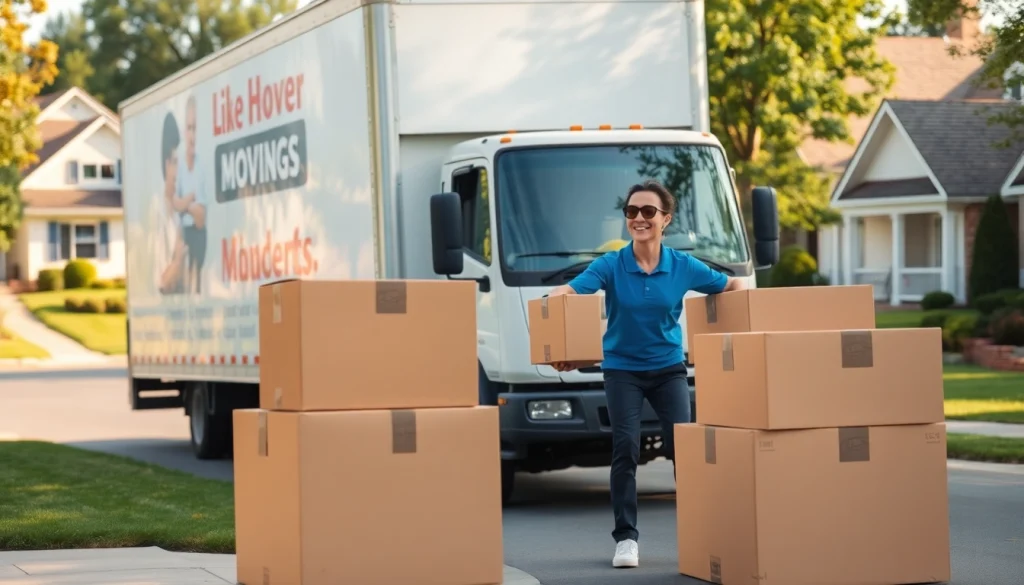Understanding House Moves
What Are House Moves?
House moves refer to the process of relocating from one residential property to another. This typically involves getting your belongings from the old home to the new one, which can include anything from packing up clothes and furniture to transporting delicate items like artwork or electronics. The term “house moves” is often broadly interpreted to encompass all aspects of moving, including planning, organizing, and executing the relocation.
For those looking to make house moves easier and more efficient, understanding the underlying framework and logistics of moving is essential.
Types of House Moves
There are various types of house moves, each with distinct characteristics and requirements:
- Local Moves: Generally defined as moves within the same city or town. These moves are usually shorter in distance compared to long-distance relocations, typically requiring less time and cost.
- Long-Distance Moves: Involves relocating beyond a specific distance, often across state lines or even to different regions of the country. Long-distance moves require careful planning and coordination, especially regarding logistics.
- International Moves: These moves involve relocating to another country. International moves come with extra complexities such as customs regulations, international packing standards, and potential language barriers.
- Corporate Moves: Often involves moving a business’s employees and their families from one location to another. Corporate moves might come with specific requirements, like relocating office equipment and sensitive documents.
- Senior Moves: This type of move is tailored to seniors transitioning from long-term residences to smaller homes, assisted living, or retirement communities. These moves may require additional care and consideration for the emotional aspects of relocating after many years in one home.
Common Challenges During House Moves
House moves can be filled with challenges, making them stressful and overwhelming. Here are some common obstacles one might face:
- Time Constraints: Balancing work, family obligations, and moving tasks can lead to time management issues, potentially resulting in a rushed and disorganized move.
- Logistical Issues: Finding the right moving truck size and managing packing schedules can be tricky. Ensuring efficient loading and unloading can often become problematic, especially without a solid plan in place.
- Emotional Stress: Moving can be an emotional process, whether it’s leaving behind a beloved home or dealing with the chaos of packing. Many individuals may experience anxiety or nostalgia associated with their previous living situation.
- Physical Challenges: The physical demand of moving heavy furniture or packing items can lead to injuries if proper techniques are not followed. Physical strain can be a significant concern, especially during long moves.
- Cost: Budgeting for a house move can be challenging, as unexpected expenses often arise, such as additional storage costs or last-minute moving supplies.
Preparing for Your Move
Creating a Moving Timeline
A well-organized moving timeline is crucial in the preparation phase of any house move. It helps in managing various tasks systematically and reduces the likelihood of overlooking important details. Here are the steps to consider:
- Set a Moving Date: Decide on your moving day based on your schedule, ideally during seasons or days when moving services may be less busy, allowing for better availability and pricing.
- Create a Task Checklist: Organize tasks by weeks or days leading up to the move. This could involve scheduling utility transfers, arranging movers, and notifying schools, etc.
- Begin Decluttering: Start decluttering at least one month in advance. Sort belongings to determine what to keep, donate, or discard.
- Finalize Moving Services: Decide whether to hire professionals or take a DIY approach, and book your moving company two to four weeks in advance.
Essential Packing Tips
Packing efficiently can save time and prevent damage during a house move. Here are some expert tips:
- Gather Quality Packing Supplies: Invest in sturdy boxes, tape, bubble wrap, and protective materials to safeguard your belongings during transport.
- Pack Room by Room: Focus on one room at a time to stay organized. Label each box clearly with its contents and the room it belongs to.
- Prioritize Essential Items: Pack essential items separately for easy access upon arrival at your new home, including toiletries, medications, and a few changes of clothes.
- Disassemble Furniture: Take apart larger pieces of furniture so that they can fit into boxes and containers, preventing potential damage during the move.
- Use Soft Items: Utilize soft items like blankets and towels as padding for fragile items to save on packing supplies.
Choosing the Right Moving Company
Selecting a reputable moving company can greatly influence the success of your house move. Consider these factors:
- Research: Read reviews and seek recommendations to compile a list of potential moving companies.
- Get Quotes: Request quotes from multiple companies to compare prices and services offered. Look for transparency in pricing with no hidden fees.
- Check Credentials: Ensure the company is licensed and insured, and check their standing with the Better Business Bureau (BBB).
- Ask About Experience: Inquire about the movers’ experience, particularly with your specific type of move, such as long-distance or corporate moves.
- Confirm Services Offered: Confirm that the moving company offers the services you need, such as packing, storage, and transportation.
Executing Your House Move
Loading the Moving Truck Efficiently
Loading the moving truck can be a logistical challenge. Here are strategies for ensuring that everything fits safely:
- Load Heavy Items First: Begin with heavier items and place them at the bottom of the truck. This provides a solid base and prevents top-heavy loads that could shift during transport.
- Fill Empty Spaces: Use boxes and smaller items to fill gaps. This minimizes movement during transit and uses the truck’s space effectively.
- Secure Items: Strapping down heavier items with moving straps can add stability, while packing materials can protect fragile pieces.
Managing the Moving Day
Moving day can be frantic, but being prepared and organized can make the experience smoother:
- Designate a Point of Contact: Appoint someone to manage the logistics on moving day. This could be a family member, friend, or hired professional.
- Stay Hydrated and Fed: Encourage everyone involved to stay hydrated and take breaks as needed, ensuring that your energy levels remain steady throughout the day.
- Keep Essentials Accessible: Have a box containing essential items for the first day or two in your new home, including tools, toiletries, and snacks, to avoid delays while unpacking.
Unpacking Strategies for Your New Home
The process of unpacking can be as challenging as packing. Here are some proven strategies:
- Unpack Room by Room: Similar to packing, focus on unpacking one room at a time. This strategy can alleviate feelings of overwhelm.
- Prioritize Living Spaces: Start with essential areas like the kitchen and bedrooms to quickly establish livable conditions.
- Organize as You Unpack: Settle items into their designated spots as you unpack rather than piling everything in one area, leading to a clearer space quicker.
Post-Move Considerations
Settling into Your New Neighborhood
Integrating into a new neighborhood can significantly enhance your living experience. Here are steps to help you settle in:
- Introduce Yourself: Take the time to introduce yourself to your neighbors. Create a friendly atmosphere and build connections.
- Explore Local Amenities: Get familiar with nearby parks, grocery stores, and restaurants. This exploration can help establish a sense of belonging.
- Join Community Groups: Look for local clubs or social media groups related to your interests, which can further immerse you in community activities.
Maintaining Your Equipment and Supplies
Post-move is also the time to take stock of your equipment and supplies:
- Inventory Remaining Supplies: After your move, check what packing materials you have left over. This inventory can help manage future moves or decluttering.
- Cleansing Your Previous Supplies: Dispose of or recycle any packing materials responsibly to help maintain environmental concerns.
- Packing For Future Moves: Having leftover boxes and materials can aid future moving endeavors if you plan to relocate again.
When to Hire Additional Moving Services
There might be situations where hiring additional services can make the moving process easier:
- Storage Needs: If your new home isn’t ready, consider temporary storage services for your belongings until you can move into your new home.
- Cleaning Services: Hiring a cleaning service to clean your old home post-move can relieve stress and ensure you meet any lease or sale agreements.
- Specialized Transport: If you own high-value items, like art or a piano, it might be beneficial to hire specialized movers who have the required expertise and equipment.
Tips for Cost-Effective House Moves
Budgeting for Your Move
Budgeting effectively is paramount for controlling costs during a move:
- Start Early: Begin budgeting at least two months before your planned moving date to ensure you can allocate and manage funds appropriately.
- Factor In All Costs: Consider costs beyond hiring a moving company, such as packing materials, insurance, fuel for self-moves, and possible storage fees.
- Explore Tax Deductions: Investigate if you’re eligible for any deductions on moving expenses, particularly if the move is work-related.
Saving on Packing Materials
There are several ways to save on packing materials without sacrificing safety:
- Reutilize Household Items: Use old newspapers, clothing, or towels for wrapping delicate items and reduce the need for additional packing materials.
- Visit Local Retailers: Many grocery stores and retailers offer free boxes to eliminate buying cardboard ones.
- Borrow from Friends: If you have friends or family who recently moved, ask to borrow their moving supplies.
Leveraging Off-Peak Moving Discounts
Choosing strategic timing for your move can result in significant savings:
- Move During Off-Peak Seasons: Plan your relocation during the late fall or winter months when demand is lower, often resulting in discounted rates.
- Opt for Mid-Week or Mid-Month Moves: Moving on weekdays, particularly from Tuesday to Thursday, may also yield better pricing.
- Book in Advance: Booking your move ahead of time can frequently afford you lower prices compared to last-minute hires.


